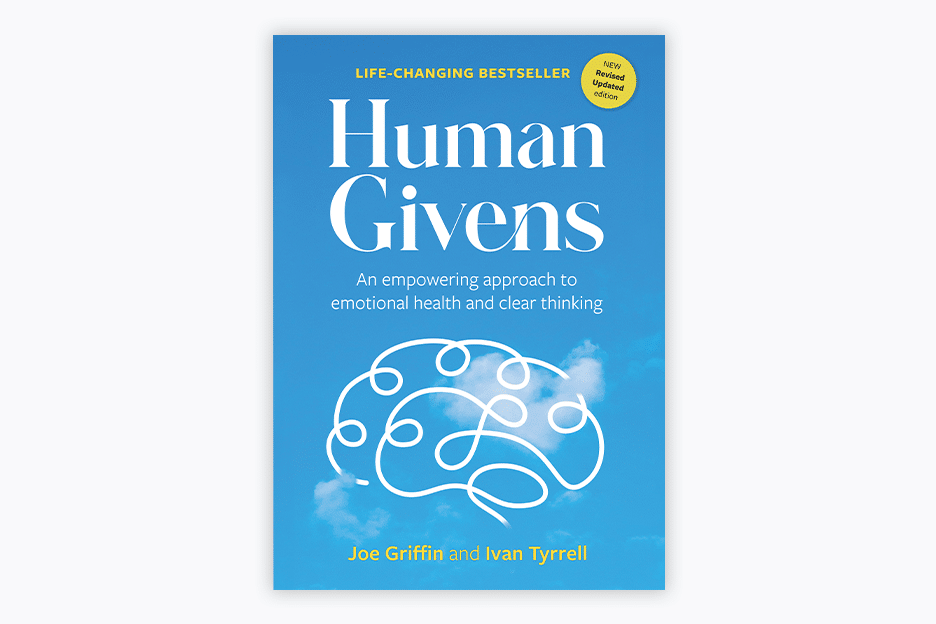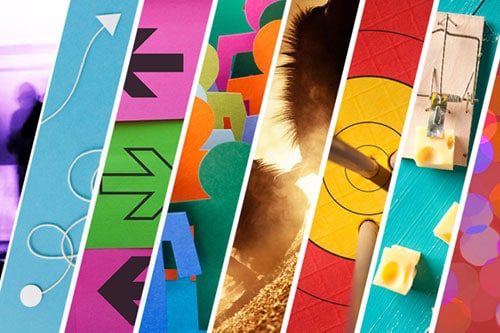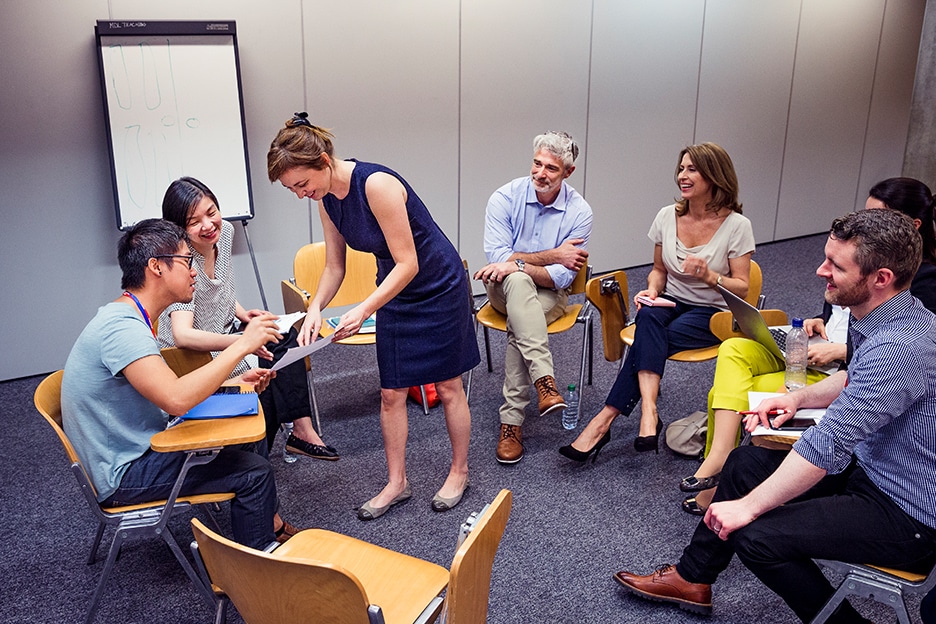Reading list
This reading list is an integral part of your self-directed learning during the Human Givens Diploma.
It is made up of core mandatory texts and podcasts, and a list of suggested further reading – with guidance on reading critically. There is also guidance on when you need to read the core and suggested texts.
BLACK FRIDAY SALE
Enjoy an EXTRA 10% discount on all online courses and publications – and 10% OFF any in-person workshop of your choice – with the code ‘BLACK-FRIDAY’ – offer ends Tuesday 3rd December ’24.
Download complete reading list
Core texts – mandatory reading
Human Givens: An empowering approach to emotional health and clear thinking by Joe Griffin and Ivan Tyrrell, Human Givens Publishing Ltd. (2024). Buy
An idea in Practice: Using the human givens approach edited by Ivan Tyrrell and Joe Griffin, Human Givens Publishing Ltd (2007). (Currently out of print, but available from various sellers.)
Why We Dream by Joe Griffin and Ivan Tyrrell, Human Givens Publishing Ltd. (2014). Buy
The Part 2 Diploma Manual – this is sent out to students before attending Part 2.
The Human Givens Journal – current issues and back issues.
The Good Mental Health podcasts generally, but specifically:
- Exploring sleeping and dreaming – with Joe Griffin
- How too little REM sleep can contribute to suicidal thoughts, self-harm and anxiety – with Ezra Hewing
- Why having a healthy mind AND body matters – with Andrew Morrice
- Learning and anxiety – with Joanna Baker
- How untreated trauma can cast a shadow over your future – with Ros Townsend
- Why do adults and children self-harm? – with Emily Gajewski
- Our silent emergency: Suicide – with Malcolm Hanson
To deepen your understanding on core presenting issues, we also suggest you read any of the Human Givens self-help series – on depression, anxiety, anger, addiction etc. – between Part 2 and Part 3.
When to read the core texts
Students occasionally ask in which order they should read these texts and at what point in the journey you must have read each work. Core texts must be read at least once. We have set out when you should engage with each core text below.
During Part 1
- Human Givens: An empowering approach to emotional health and clear thinking
- An Idea in Practice – using the human givens approach
- Why We Dream
- The Good Mental Health podcast series – titles listed above
In preparation for Part 2
- The Diploma Manual – we recommend you read it several times
- Your course notes / workbooks from your Part 1 training
You must read the whole Diploma Manual before attending Part 2 and between the two weeks.
Between Part 2 and 3
The Human Givens Journal – current and back issues
We suggest you also read any of the texts from the Human Givens self-help series to deepen your understanding on core presenting issues – depression, anxiety, anger, addiction etc. – between Parts 2 and 3.
Further reading
There is no requirement to read every text on this list of further reading, but we do suggest you read at least a few. It has been put together to guide you to some reliable and important texts that can support your learning and is organised so you can follow your interests. Engaging with reliable, up-to-date evidence and reasoning is an important part of your ongoing development.
Important:
The majority of texts on this reading list are not Human Givens texts. Much of the evidence they draw upon supports the core Human Givens organising ideas, but the authors may come to different conclusions – most will be unaware of the human givens approach yet.
You should engage with these texts critically, some of what they contain will be useful and some less so. In particular, you should consider how we might view this work from a Human Givens perspective; where do the authors agree with the Human Givens ideas, where do they disagree, what evidence and ways of thinking inform this? We have provided some brief guidance below to help stimulate your thinking.
It is also important to remember that while books are important, they are summaries of evidence, usually brought together to support a particular case. There may be conflicting evidence in the research literature and the papers being quoted may be more nuanced in their findings than the book authors suggest. Research also moves faster than book publishing and the current research consensus may have moved on from when the book was first written.
You should use these texts to develop your thinking and your questions – not to take them as absolute truth.
Our needs and mental health
Loneliness: Human Nature and the Need for Social Connection
by John Cacioppo & William Patrick, W.W. Norton & Company.
NOTE: John Caccioppo was a social neuroscientist – he studied the impact of social connection and loneliness on the brain. His work provides very solid evidence for our social needs – when they are not met it immediately impacts on physical and mental health. You may wish to consider how this fits within the central Human Givens organising idea.
Self-Determination Theory: Basic psychological needs in Motivation, Development and Wellness
by Ryan, R. M. & Deci, E. L.: Guilford Press.
NOTE: Self-determination theory is now a well-established and well supported theory within psychology. The theory proposes three basic psychological needs that must be satisfied to foster well-being and health. These three psychological needs are autonomy, competence and connection. However, some needs may be more salient than others at certain times and be expressed differently based on time, culture, or experience. SDT states that if these needs are met they allow optimal function and growth: the three needs in SDT map well to the emotional needs within Human Givens. The theory also does much to explore human motivations and our ongoing need to develop and grow.
Happier: Can you learn to be happy?
by Tal Ben-Shahar, McGraw Hill.
NOTE: Tal Ben Shahar was a Harvard academic who delivered a happiness programme that became the most popular course in Harvard’s history. Happier captures a lot of the work that went into those classes. Drawing on research and his own life, the book explores the myth that chasing ‘success’ will make you happy. Instead, it proposes that careers that lead to fulfilment and happiness provide meaning, pleasure and a sense of achievement and growth by utilising your strengths. From an HG perspective, we can see why these needs can have such a powerful and positive impact on our lives – but may also notice that this isn’t the whole picture.
Happiness by Design: Finding pleasure and purpose in everyday life
by Paul Dolan, Penguin.
NOTE: Paul Dolan is a utilitarian with regards to wellbeing. The standard utilitarian view is that wellbeing comes from maximising pleasure and minimising pain. Dolan makes an interesting move to address one of the weaknesses in this theory by suggesting that we need a balance of pleasure and meaning in our lives. His book provides lots of evidence of the need people have for meaning. From an HG perspective, Dolan’s analysis is limited – pleasure without effort can be dangerous and genuine pleasure tends to come from meeting our needs. However, this is a useful read that provides a good summary of evidence about things that can help increase happiness.
The Power of Meaning: crafting a life that matters
by Emily Esfahani Smith, Rider.
NOTE: In this book, Smith argues for the pursuit of meaning rather than the pursuit of happiness as the route to a fulfilling life. She identifies 4 pillars of meaning — belonging, purpose, storytelling and transcendence – and uses her own life and background to bring different cultural perspectives to bear on her tale and argument. From an HG perspective there is much to consider here and it provides a useful prompt to think more deeply about our need for meaning and how that may be shaped. However, by focusing entirely on meaning as the route to a better life, the book does not acknowledge the weight of other important needs and arguably places much responsibility on a Stoical approach of an individual to determine their own wellbeing.
The Inner Level
by Richard Wilkinson and Kate Pickett, Penguin.
NOTE: The Inner Level is Wilkinson and Pickett’s follow up to The Spirit Level, a book which looked at the economics of inequality. In this book they look at the impact of economic and social inequality on mental health. In particular, for our interest, they gather together a significant body of evidence for the importance of our need for status. When people feel they have no status or value in society it has a real impact on our wellbeing. You may wish to consider whether the central argument can entirely explain all of human misery or just part of it – does it miss some of our needs?
Why We Sleep
by Matthew Walker, Penguin.
NOTE: Matthew Walker is one of the foremost researchers on sleep in the world. He and his team have done much to help us understand the important relationships between sleep and mental and physical health. This book is a good summation of what we knew about sleep at the point it was published (sleep science moves fast, but most of this part is still valid). From a HG perspective the section on which Walker’s book can be critiqued is on dreaming. He recognises that dreams must be playing some part in de-arousing emotions (now broadly accepted) but does not recognise that this applies to emotions which have not been acted upon and therefore need to be fulfilled – as explained by Joe Griffin’s expectation fulfilment theory.
Chasing the Sun: The New Science of Sunlight and How it Shapes Our Bodies and Minds
by Linda Geddes, Wellcome Collection.
NOTE: In this book Geddes examines one of our physical needs – the need to access sunlight – and examines its impact on both physical and mental health. It is an interesting exploration of how one of our physical needs can have such a significant effect but – as with other books that consider one aspect of wellbeing – it is important to set this back in the context of our other needs that must also be met in a healthy balance.
Important psychology texts
The Paradox of Choice: Why More Is Less
by Barry Schwartz, Ecco.
NOTE: This controversial book provides a challenge to the idea that choice is always a good or helpful thing. Using research conducted over decades, Schwartz sets out the argument that while we require some choice to be healthy (to meet our need for control), too much choice can become overwhelming, anxiety inducing and can actually impede decision-making. Schwartz’s work has come in for criticism from those who find the idea dangerous and attempts to duplicate the paradox of choice in other studies have had mixed success – although this may be to do with nuances in the studies and different people being impacted differently by choice options. Nevertheless, thinking about Schwartz’s argument can be a helpful prompt to think more deeply about what balance really means.
Doctoring the Mind: Why psychiatric treatments fail
by Richard P Bentall, Penguin.
NOTE: This seminal text provides a critique of the psychiatric approach to mental illness. In it, Bentall traces the development of diagnostic criteria and of attempts to find brain based causes of illness. He argues that the medical approach to mental illness has failed because of its failure to engage with wider causes rooted in the environment and our need for meaning, connection etc. Bentall has researched and pioneered the use of CBT for psychosis. This book, is therefore not from an HG perspective. HG students may wish to consider how Bentall’s arguments and evidence overlap with the HG approach and what nuance we may need to bring to our work to be consistent with the evidence.
Thinking Fast and Slow
by Daniel Kahneman, Penguin.
NOTE: In this bestselling work Kahneman summarises the findings of his research gathered over decades, with his collaborator Amos Tversky. Kahneman uses a metaphor to describe two systems in the brain that govern our actions – one which is quick and based on emotions and patterns and the other, which is slower and uses more detailed reasoning. He shows how often, when we think we are using the second system (reasoning), we are actually just responding to patterns. This provides good support for APET. Do be careful when reading this not to lose sight of the fact that the central conceit is a metaphor and not a description of exactly how the brain does work.
Inventing Ourselves: the secret life of the teenage brain
by Sarah-Jane Blakemore, Black Swan.
NOTE: This book looks at the development of the adolescent brain and its relationship to teenage behaviour, feelings and social connection. Blakemore argues that teenage behaviour is not an aberration but a functional stage of our development and that common behaviours and responses can be explained by the ways in which some brain networks develop more quickly than others. This is important in understanding that adolescent needs may be expressed and met differently and that their social environment is crucially important. From an HG approach we can see that Blakemore’s findings highlight the importance of teenagers being supported to meet their needs within their adolescent experience – not imposing adult models onto them.
How Emotions Are Made: The secret life of the brain
by Lisa Feldman-Barrett, Pan.
NOTE: Feldman-Barrett is a social constructivist – she believes that instances of emotion are constructed predictively by the brain in the moment as needed, rather than being genetically endowed. She argues that the emotions we experience develop in relation to our social context and learning – there are no basic, shared emotions across cultures. Rather, we experience feelings that we then label as emotions, to give these feelings meaning and guide our actions. These feelings can also be mislabelled, resulting in actions which may be misguided. The evidence gathered by Feldman-Barrett is a strong argument for the influence that social context and stories have on us from an early age – influencing us at a very basic level. As she says, our brains are shaped by story. However, you should be aware that not all researchers accept her view. Some suggest she doesn’t grasp the evolutionary basis of emotional responses or that she mistakes the difference between experience and the language for experience. Some of her conclusions have also been critiqued for missing the role of culture in people’s self-perception.
The Observing Self
by Arthur J. Deikman, Beacon Press.
NOTE: In this work, Deikman explore the ways in which the mystical tradition can enable Western psychology to come to terms with the essential problems of meaning, self, and human progress. The Observing Self is a complex concept and this work is not an easy read for all students. However, when it was published in 1983, it did important work in helping to form a bridge between eastern and western views of human psychology. It was also an influential work in the formation of Human Givens ideas.
Flow
by Mihaly Csikszentmihalyi, Rider.
NOTE: In this work, Csikszentmihalyi draws on decades of research to explore one important trance state – ‘flow’. The book explores the ways in which flow can be achieved, the impact it has upon wellbeing, how it helps us meet needs for meaning and how this requires ongoing sustainable challenge. Criticism of this work highlights the limited role it allows the environment and that not everyone can achieve flow, given their circumstances and certain toxic environments. While finding flow can help us become happier it cannot help us meet all of our needs or overcome all barriers.
Flourish
by Martin Seligman, Nicholas Brealey Publishing.
NOTE: In Flourish, Martin Seligman sets out the case for the positive psychology movement. The starting point for positive psychology is that for too long psychology has focussed on what happens when things go wrong and not enough on what happens when people are happy and well. Seligman comes to a similar conclusion to the HG organising idea – people are happy when needs are met, but he has a different set of needs: Positive emotion, Engagement, Relationships, Meaning and Achievements (PERMA), although, as you will see, there are many overlaps. The book also highlights many evidence-based practices in therapy that we also use in HG. From an HG perspective there are gaps in this work. Positive psychology has been critiqued for minimising the role of the environment, culture and physical needs and placing too much weight on the role of the individual. You may wish to consider any other commonalities or differences as you read.
Ethics, philosophy and society
Humankind: A Hopeful History
by Rutger Bregman, Bloomsbury.
NOTE: In this work, Bregman challenges the view that people are naturally cruel and selfish. Drawing on evidence from a range of disciplines and demythologising some famous findings in psychology, he argues that we are naturally kind because we are driven by common needs to connect with other humans. But we can be manipulated into becoming cruel or suspicious. In his view, the idea everyone else is selfish has become a societal nocebo – because we believe it we act suspiciously towards others. Critiques of the book suggest that the arguments are simplified, at times contradictory and some of his evidence cherry picked. Considering the argument alongside our understanding of human needs may add some complexity to the argument and some additional challenges to his ideas.
Nicomachean Ethics
by Aristotle.
NOTE: The Nicomachean Ethics is one of the most important works in western philosophy. In it, Aristotle argues that to flourish we need to grow and develop, so we can take pleasure and meaning from living a virtuous life. The book is packed with insights about what it means to be human and introduces the concept of balance as being key to wellbeing. Importantly, Aristotle doesn’t seek balance as a midpoint between extremes. He recognises that it may move dependent on the virtue or circumstance. However, this book was written around 4BCE and some of the views expressed we now recognise as indefensible – particularly with regard to women and slaves. Nevertheless, we can take much wisdom from it if we engage critically with the text. (Do be careful which translation you choose – some are easier to read than others).
How the World Thinks
by Julian Baggini, Penguin.
NOTE: In this work Baggini sets out to introduce western audiences to philosophical thought from around the world – particularly from beyond the west. There is much in this book, even though it is really an introduction to the ideas from other cultures. However, it is a useful read as a therapist, as it can help to expand your understanding of other cultures, their stories and other models of reality. Paying attention to understandings from other cultures, can also help us better understand our own models of reality and how they may create ‘animals’ for us in therapy.
The Exploits of the Incomparable Mulla Nasrudin
by Idries Shah, ISF Publishing.
NOTE: This book collects many of the Mullah Nasrudin tales. Reading through them can be a useful way of increasing your stock of stories – you may also wish to consider how each story may be interpreted and understood by different clients.
Books about learning
How We Learn
by Benedict Carey, Macmillan.
This book takes an evidence informed approach to look at what strategies for learning are effective – it may help you think about how you can support your ongoing learning.
Be Well, Learn Well
by Gareth Hughes, Bloomsbury.
This book looks at the ways in which students can use learning and wellbeing to support each other. It is written for university students but may have broader application for those on the Diploma.
When to read
The above suggested further reading list should be taken at your own pace. It is not a requirement to have read every book on it. However, most students benefit from reading these texts throughout the course – you can begin with the books that seem most relevant and interesting to you. Please take note of the critical reading guidance supplied against each text.
List last updated January 2023
Additional Listening
You may also find listening to the following both interesting and helpful:
How Stories Heal by Pat Willams, HG Publishing. Buy now
The therapeutic power of guided imagery by Joe Griffin and Ivan Tyrrell, HG Publishing. Buy now
Effective anxiety management – without drugs by Joe Griffin and Ivan Tyrrell, HG Publishing. Buy now
Effective anger management: understanding and controlling unreasonable expressions of anger in yourself and other people by Joe Griffin and Ivan Tyrrell, HG Publishing. Buy now
Understanding and lifting depression without drugs…by Joe Griffin and Ivan Tyrrell, HG Publishing. Buy now
Which you are you? by Pat Williams, HG Publishing. Buy now
Evolution and the Human Givens by Joe Griffin and Ivan Tyrrell, HG Publishing. Buy now




